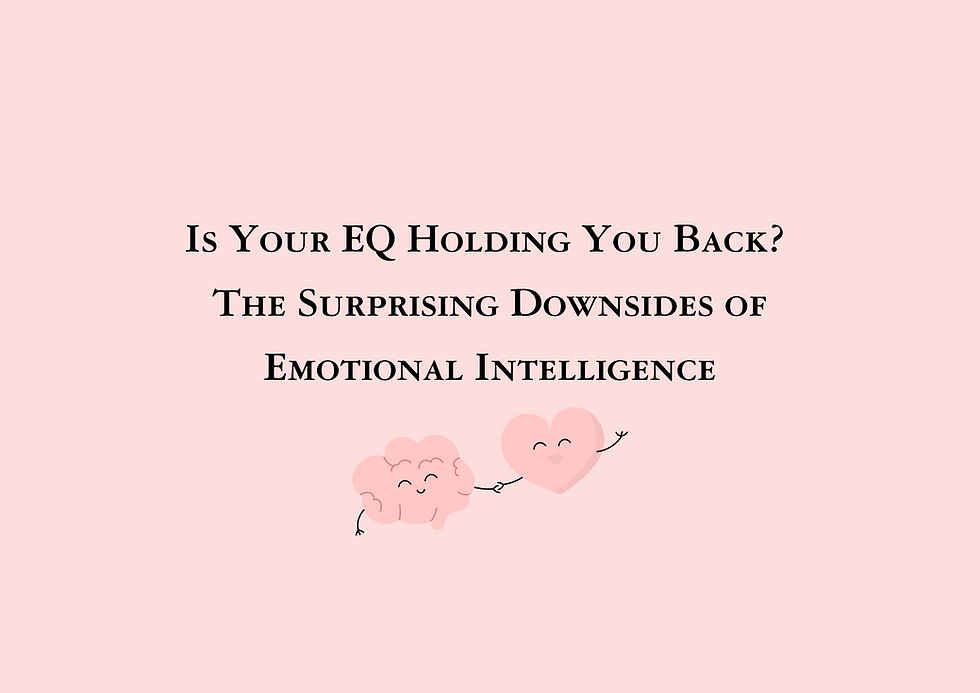Is Your EQ Holding You Back? The Surprising Downsides of Emotional Intelligence
- Midnight Musingz
- Feb 26
- 4 min read
Updated: Mar 12

The Downsides of Emotional Intelligence: When Too Much EQ Can Be a Hindrance
Emotional Intelligence (EQ) has been widely celebrated for its positive impact on personal and professional success. It enables individuals to recognize, understand, and manage emotions, both their own and those of others. High EQ is often associated with improved relationships, better decision-making, and greater overall well-being. However, like any trait, excessive or misapplied emotional intelligence can have some unintended downsides.
In this blog, we will explore the potential drawbacks of emotional intelligence and how they can manifest in various areas of life.
1. Overemphasis on Others' Emotions
One of the hallmarks of high emotional intelligence is the ability to empathize with others. However, when individuals become overly attuned to others’ emotions, it can lead to an imbalance in their own emotional well-being. Constantly prioritizing the feelings and needs of others can cause personal neglect, leading to burnout or feelings of being emotionally drained. In extreme cases, this can foster a tendency to people-please, where individuals suppress their own needs to meet the demands of others.
2. Emotional Manipulation
While empathy is a key component of EQ, it can be used for manipulative purposes. Individuals with high emotional intelligence may, intentionally or unintentionally, use their skills to influence or manipulate others' emotions for personal gain. By understanding how others feel, they might exploit those emotions to achieve their goals, whether in personal relationships or professional settings. This can lead to unethical behavior, exploitation, and a breakdown of trust in relationships.
3. Emotional Labor and Stress
The capacity to regulate and manage emotions can be a double-edged sword. While emotional regulation allows for composure in challenging situations, individuals with high EQ may often feel the burden of emotional labor. This can happen when they feel responsible for managing not only their own emotions but also the emotions of others around them. In work settings, for example, individuals in leadership positions or customer service roles may bear the weight of others' emotional needs, leading to increased stress and emotional exhaustion over time.
4. Avoidance of Conflict
Highly emotionally intelligent individuals often seek harmony and avoid confrontation. While this can contribute to smoother interactions, it can also result in the suppression of important issues. Avoiding conflict at all costs may prevent necessary conversations from happening, allowing problems to fester beneath the surface. Over time, this can lead to unresolved issues, misunderstandings, and resentment, as individuals may avoid addressing situations that require open and honest communication.
5. Overthinking and Overanalyzing Emotions
A strong focus on emotional awareness and regulation can sometimes lead to overthinking or overanalyzing emotions and social interactions. People with high EQ might become so attuned to subtle emotional cues that they end up second-guessing themselves or others. This can lead to indecision, self-doubt, and a tendency to overanalyze situations, which can delay decision-making and cause unnecessary stress.
6. Diminished Authenticity
In an attempt to manage emotions and meet others’ expectations, some individuals with high EQ may prioritize emotional regulation to the extent that they suppress or mask their true feelings. This can lead to diminished authenticity, where individuals behave in ways that are more about pleasing others than expressing their genuine selves. Over time, this can lead to feelings of disconnection from one's true identity, a sense of inauthenticity, and even a loss of self-respect.
7. Increased Sensitivity to Criticism
Although high EQ allows individuals to handle emotions with grace, it can also make them hypersensitive to criticism or negative feedback. People who are highly emotionally intelligent might take feedback too personally, believing it to be a direct reflection of their emotional capabilities. This sensitivity can lead to defensiveness, decreased self-esteem, and a reluctance to take constructive criticism, even when it’s meant to foster personal or professional growth.
8. Unrealistic Expectations of Others
Those with high emotional intelligence often expect others to behave with the same level of emotional awareness and sensitivity. However, this can lead to unrealistic expectations and disappointment when others don’t meet these emotional standards. In relationships or workplaces, emotionally intelligent individuals might become frustrated with others who are less empathetic or emotionally regulated, which can create a disconnect or tension.
9. Imbalance Between Logic and Emotion
While emotional intelligence emphasizes emotional awareness and regulation, it does not always encourage individuals to balance these emotions with logical reasoning. Overreliance on emotional intelligence can sometimes overshadow rational decision-making, causing individuals to make choices based on emotions rather than facts. This can result in impulsive decisions, biased judgments, and potential negative consequences in both personal and professional situations.
Conclusion
Emotional Intelligence is undeniably a valuable asset that can enhance communication, relationships, and personal growth. However, like any trait, it’s important to recognize when an excess of EQ may cause harm rather than help. Overemphasizing others' emotions, emotional manipulation, conflict avoidance, and other potential downsides of EQ are real risks that can arise when emotional intelligence is not applied mindfully.
To maximize the benefits of EQ, it’s essential to maintain balance—ensuring that emotional awareness and regulation are used to foster positive connections, without compromising authenticity, personal boundaries, or rational decision-making. Ultimately, cultivating emotional intelligence should be about empowering both yourself and others to thrive emotionally, while keeping in mind the importance of self-care, healthy boundaries, and authenticity.
Ready to develop your emotional intelligence? Explore our resources, take an EQ assessment, or join our community to continue learning and growing!

Comments